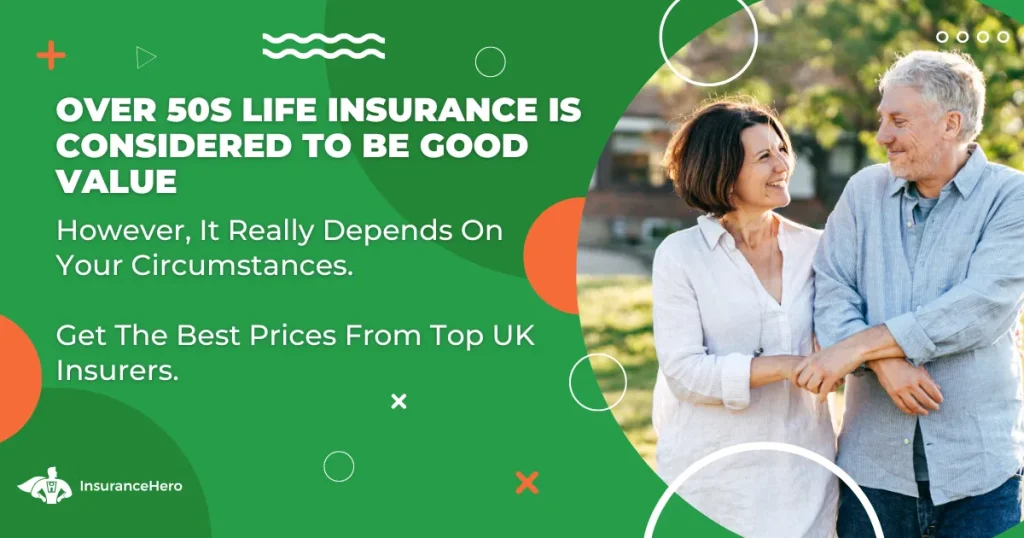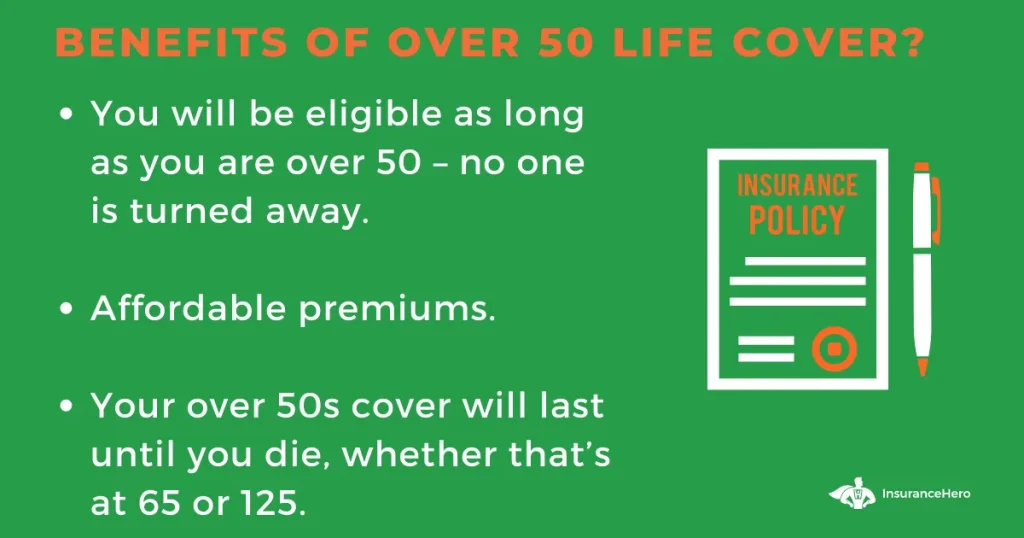Is Life Insurance Worth It After 50?

For many, getting life insurance after 50 seems like an unnecessary expense. After all, the older you get, the more expensive your life insurance policy will be. At this stage of life, do you really need to buy an over 50s cover?
So, is life insurance worth it after 50? That depends. Over 50s life insurance can prove invaluable even when you have enough money saved to deal with your expenses or debts, especially if you have financial dependents.
On the other hand, if no people depend on you financially, buying life insurance coverage after 50 might not seem so important to you.
Which way should you go, then? To buy or not to buy, that is the question. And if you buy, what is the best over 50s life insurance? Let’s explore over 50s life insurance to help you decide whether you need it.
Looking For The Best Over 50s Life Cover? Compare The Leading Life Insurance Companies Below – 60 Sec Form


What Is Over 50s Life Insurance?
An over-50s life insurance policy is a protection plan for UK residents aged between 50 and 80. It works very similarly to other life insurance policies, consisting of monthly premiums you need to pay to stay covered.
What differentiates over 50 life insurance plans is that they don’t require pre-policy medical checks to get accepted. The payout is guaranteed no matter your current physical or mental state.
It has pros, but this also means the cash payout amount will be smaller than traditional insurance policies. Therefore, over 50 life insurance is typically used for less significant expenses, such as funeral costs or charitable donations.
If you require a higher level of life cover when over 50, you can opt for traditional term life or whole life insurance plans. They will, however, cost you more and require pre-policy medical checks.
Term Life vs Whole Life Insurance After 50
As said, over 50 life insurance plans aren’t your only insurance policy options after 50. You can also opt for traditional life insurance coverage. In this case, you can choose a term life or a whole life plan.
They will offer you a higher level of protection but are more expensive and require you to undergo pre-policy medical checks.
Term life insurance provides coverage for a predefined period (up to 30 years). If you die during that period, the insurer will pay out the specified amount to your beneficiaries. However, once it ends, you lose your coverage. You can then renew it or leave it as it is.
Whole life insurance, on the other hand, lasts throughout your life. It will continue until you die.
So which one to choose? That depends on your specific needs.
Term life insurance is more affordable but lasts for a specific period. As you age, renewing it will cost you more.
Whole life insurance is much more expensive, but it provides peace of mind that your family stays protected.
Pros and Cons of Getting over 50s Life Insurance
To fully understand whether you might need over 50s life insurance, we must consider both the pros and cons of the plans available. Let’s begin with the advantages:
- Guaranteed acceptance. The most significant benefit of over 50 life insurance policies is that they are all guaranteed acceptance plans. No pre-policy medical checks are required, meaning you can get your insurance regardless of your physical or mental state.
- It’s a whole-life coverage. Over 50 insurance plans work like whole-life policies, covering you from the moment you buy it until you die. Top-tier insurers also offer a cutting point for paying in (typically when you turn 80-85), protecting without paying monthly premiums.
- Low-cost premiums. Since the sum guaranteed in over 50 policies is relatively low, the monthly premiums are much more affordable than traditional policies.
As for the potential drawbacks of such plans, we can include the following:
- Waiting period. Insurance companies consider over 50 plans to be higher risk, often involving a waiting period (1-2 years). If you pass away during that period, the insurer won’t pay out the full amount, but your premiums will be repaid.
- The size is lower. While the lack of pre-policy medical checks and guaranteed acceptance rule apply to more affordable premiums, they also mean such plans are smaller than traditional policies. That said, over 50 life insurance won’t cover larger expenses like a mortgage.
If you opt for traditional term life or whole life insurance, the most significant disadvantage is the higher monthly premiums. It’s natural for insurers to charge their clients more as they get older. There’s no way around it, unfortunately.
We Can Help Find The Best Cover For You At A Great Price. Protect Your Family Today


Why Should You Get Life Insurance After 50?
If you still have doubts about getting life insurance after 50, let’s look at the most common reasons for people over 50 to buy life insurance policies, be it over 50 coverage, life term policy, or whole life plan.
You Want To Ensure Your Loved Ones Are Taken Care Of
Whether it’s your children, grandchildren, husband, wife, or parents, if they depend on your financial aid, you probably want them to be taken care of if something happens to you.
If you haven’t saved enough money to cover all your needs, getting life insurance is the best way to ensure you don’t leave your loved ones empty-handed.
Even if the sum isn’t overly significant, like in the case of over 50s insurance plans, leaving your family some extra money is always a nice gesture, especially if it doesn’t cost you too much.
Moreover, if you die unexpectedly and your family cannot pay for your funeral, a lump-sum payout from your insurance policy will help cover the funeral costs.

You Want To Pay Off Outstanding Debts
Are you still struggling with any outstanding debts? A mortgage, perhaps, or a college loan? If so, your family will have to pay for you if you die. In the worst-case scenario, it can even cost them their home. Why risk such a situation?
Life insurance can be invaluable. It can help pay your debts and provide your family with financial security if you pass away.
It doesn’t matter whether you’re 40, 50, or 60. Life insurance is necessary if you want peace of mind that your family stays protected.
Your Existing Coverage Has Expired
Do you have term life insurance coverage that has expired or is about to do so? If so, getting over 50 life insurance might be a good idea.
It won’t cost you as much as another term life policy, protecting your family from less significant expenses such as funeral costs and credit card debts.
Again, it will all depend on your current situation. You might require a higher level of protection. If so, renewing your term life policy or getting a whole life plan might be better.
It will cost you more, but the longer you wait, the more expensive these options will get.
Your Employer Insurance Isn’t Flexible Enough
You might be taking advantage of employer-provided coverage, but what if it doesn’t offer the required flexibility? While they have several benefits, employer-provided life insurance policies aren’t as flexible as individual plans.
If you have been using one for some time but believe you require the change, your 50s is probably the last call for making that switch. If you wait too long, you will only pay much more than you would like.
Is Life Insurance Worth It for People Over 50?
Yes, it is. Life insurance can be invaluable, whether you are 30, 50, or 60, even if you believe you might not need it. Why?
No matter how good your current situation might be, you can’t predict it won’t take a 180-degree turn, leaving you and your family without proper protection.
Indeed, if you’re yet to get life insurance, your 50s is probably the last call for you to do that. You won’t get any younger, and as stated numerous times throughout this guide, the older you get, the more the insurer will charge you.
Also, turning 50 grants you access to over 50s life insurance plans offered by numerous UK insurance companies.
Such plans are much more affordable than traditional life insurance policies. While they won’t cover more significant expenses, they assure your family gets at least some form of protection if you pass away.
How To Choose the Best Over 50s Life Insurance?
Once you decide whether you need life insurance after 50, it’s time to choose the coverage that best suits your requirements. There are several considerations here that you need to think about.
That said, when comparing insurance providers, ask yourself the following questions:
- How much coverage do you need?
The higher the coverage in life insurance, the more significant the lump sum paid out to your beneficiaries. Think about your needs. For example, if you have some savings, you may not require an exorbitant cover but rather enough to cover your funeral costs (which is £4,000 in the UK). - What is the cost of insurance?
How high should your monthly premiums be? Remember that the lower the premiums, the lower the final payout. If you want to leave your family with a higher level of protection, you should expect to pay more for your coverage. - How long do you need your cover for?
You may not require whole life insurance. For example, a more affordable option might be considering a term life policy for a specific period, such as your children’s graduation. - Are there any maximum entry age limits?
Being over 50 means you can be anywhere between 51 and 100. If you’re reading this guide when you’re 79, be quick, as most over 50 life insurance plans have a maximum age limit of 80. However, it can be higher or lower, depending on the insurer. - What should my life insurance cover?
Not all life insurance policies are created equal. Think about how comprehensive you need the cover to be. When comparing the best over 50 life insurance policies, be sure they come with guaranteed acceptance, a payout guarantee, a cease of premium limit, immediate accidental death cover, flexible payments, full insurance cover after a year, and a funeral benefit option.
When You Might Not Need To Get Life Insurance After 50?
Although having life insurance after 50 always adds a layer of protection, sometimes, getting it might seem like a bit of a stretch.
If you’ve already paid off your mortgage, don’t have any substantial debts, have paid off your kids’ education, and you and your partner have enough financial stability to deal with any potential problem, life insurance may add an unnecessary expense to the equation.
The Crucial Role of Healthful Habits for Those Over 50
Here are several key points to consider:
- Nourishing Meal Choices: Include a diverse range of fruits, vegetables, lean proteins, and whole grains in your daily diet. Ensure you’re well-hydrated and curb your intake of saturated fats and convenient, processed foods.
- Consistent Physical Activity: Regular physical activity is imperative to keep both body and mind in peak condition. This could include activities such as power-walking, swimming, resistance training, yoga, or dance.
- Health Assessments: Regular tests for blood pressure, cholesterol levels, and other potential health risks enable better personal health management and contribute to the prevention of serious diseases.
- Cognitive Engagement: Maintain brain fitness by engaging in puzzles, reading, writing, or learning a new language or skill. This can help stave off cognitive decline.
- Sufficient Rest: Insufficient sleep can lead to various health issues, including memory problems and weight gain. It is advised to target 7-9 hours of sound sleep each night.
Explore various proactive recommendations in our guide designed for individuals 50 and above, focusing on promoting healthy ageing.
Further reading:
- Life Insurance For Over 55 With No Medical Exams: No-medical-exam over 55 policies offer quick approval and peace of mind for those over 55 with health concerns or pre-existing conditions.
- Over-50 Life Insurance vs. Funeral Plans: Life insurance provides broader financial support, while funeral plans are specifically designed to cover end-of-life service costs.
- Over 50 Life Insurance Average Cost: Monthly premiums typically vary based on age, coverage amount, and provider, with average costs starting from around £10–£30.
Is Life Insurance Worth It After 50 Final Thoughts
Suppose you’re in your 50s and still haven’t any life insurance (or your term life policy has expired). In that case, you might consider whether you need the coverage, especially given the higher insurance costs awaiting you as you age.
The answer to whether life insurance is worth it after 50 isn’t that straightforward. As discussed, it all depends on your specific life and financial circumstances.
In general, you will need life insurance after 50 if:
- You still have substantial debts (e.g., mortgage) to pay off;
- Your family members depend heavily on your financial help;
- You don’t have enough savings to leave your loved ones after your death.
On the other hand, if none of the above examples applies to you, you have your debts paid off and have enough savings to cover your family, so getting life insurance in your 50s might not be necessary.
You need to assess your situation. Consider whether life insurance can help you and your family and how much coverage you need. If you still want to add a layer of protection, you can consider getting an over 50 life insurance plan with lower costs and decreased coverage.
If you require a higher level of protection, you should consider getting traditional term life or whole life insurance. No matter which one you choose, please consider using Insurance Hero to compare insurers and find the best quote (free of charge) for your circumstances.
Steve Case is a seasoned professional in the UK financial services and insurance industry, with over twenty years of experience. At Insurance Hero, Steve is known for his ability to simplify complex insurance topics, making them accessible to a broad audience. His focus on clear, practical advice and customer service excellence has established him as a respected leader in the field.


